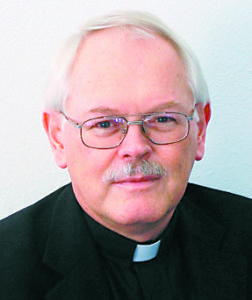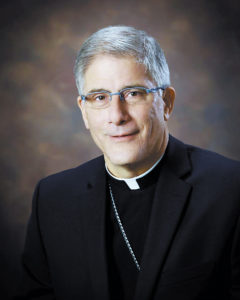
Bishop Joseph R. Kopacz
By Bishop Joseph Kopacz
(Editor’s note: Bishop Joseph Kopacz was traveling this week for the U.S. Conference of Catholic Bishops’ Fall meeting. He sent the speech he presented at the conference asking for his fellow bishops to support the cause for canonization for Sister Thea Bowman as his column for this week. See related story in this issue. His regular column will resume in the next issue.)
We all share in the joy of this moment presenting the Cause for Canonization of Sister Thea Bowman, Franciscan Sister of Perpetual Adoration, from Canton, Mississippi. With one mind and one heart the faithful within and well beyond the Diocese of Jackson have asked that Sister Thea’s cause be undertaken. I would like to frame my words around her final six years. In 1984 Sister Thea, an only child, suffered the deaths of her beloved parents, Dr. Theon and Mary. In that same year she was diagnosed with cancer. With the press of mortality, and understanding the severity of her disease, she courageously proclaimed that “she would live until she died.” Indeed, she did, traveling, evangelizing, teaching, singing and inspiring to the very end.
Likewise in 1984, this Conference issued a Pastoral Letter on Evangelization: What We Have Seen and Heard, a labor of love from the African American Bishops of the time. This letter was issued five years before Sister Thea’s celebrated presentation to the Conference in June 1989 at Seton Hall University. Her witness in word and song testified to her joy-filled holiness, even as she embraced the Cross of terminal illness. (Pause: How many Bishops present today were on hand in June, 1989?)
The Bishops in What We Have Seen and Heard gave thanks for the early missionaries who planted the seed of the Gospel in the Afro-American families and communities. In her address to the Bishops Sister Thea offered her gratitude to the missionary disciples in her life.
“Catholic Christians came into my community, and they helped us with education, they helped us with health care, they helped us to find our self-respect and to realize our capabilities when the world told us for so long that we were nothing and would amount to nothing. And I wanted to be a part of that effort. That’s radical Christianity, that’s radical Catholicism.”
Throughout her life, the gift she received, she gave as a gift until her final breath.
What We Have Seen and Heard reflected movingly on the gift of reconciliation, rooted in suffering, liberation and justice, that which the African American experience can offer to the Church, to the nation and to the world. The Bishops wrote: “A people must safeguard their own cultural identity and their own cultural values. Likewise, they must respect the cultural values of others. On this foundation can be erected an authentic Christian love, “because we who once were far off have become near by the Blood of Christ. For he is our peace, he who made both one and broke down the dividing wall of enmity, through his flesh.’ (Ephesians 2, 13-14)” As an ambassador of Jesus Christ and a minister of reconciliation, Sr Thea tirelessly laid down her life for this Gospel vision, truly the essence of her holiness. With Biblical like eloquence she declared. “We unite ourselves with Christ’s redemptive work, when we reconcile, when we make peace, when we share the good news that God is in our lives, when we reflect to our brothers and sisters God’s healing, God’s forgiveness, God’s unconditional love.”
This is the power of the Gospel that is so urgently needed in the Church and in society today.
The Church embraced Sister Thea from her early years, yet there were times she felt deeply like a motherless child. She challenged the Bishops to provide a space at the table for collaboration and leadership for all of God’s children. Today, we are most mindful of the victims of sexual abuse who live in that dark void of homelessness in the Body of Christ, and we pray that Sister Thea’s witness will be a beacon of hope for all victims and their families. There is an urgency for Sister Thea’s sanctity to be a leaven in the bread of our Church and society.
Earlier this year, Pope Francis published his Apostolic Exhortation on holiness, Guadete et Exultate. In the words of Pope Francis “Christianity spreads through the joy of disciples who know that they are loved and saved.” What We Have Seen and Heard stirringly presented the gift of joy as essential for understanding African American spirituality. “Joy is first of all celebration. Celebration is movement and song, rhythm and feeling, color and sensation, exultation and thanksgiving. We celebrate the presence and the proclamation of the Word made Flesh. Joy is a sign of our faith and especially our hope. It is never an escape from reality.” Sister Thea manifested this radiance throughout her life, and valiantly lived it in her final years. If reconciliation toward a new creation for this world was Sister Thea’s daily passion, surely joy was the charism that nurtured her great soul and holiness. Sister Thea exhorts us. “Children, Mothers, Fathers, Sisters, Brothers, go! There is a song that will never be sung unless you sing it. There is a story that will never be told unless you tell it. There is a joy that will never be shared unless you bear it. Go tell the world. Go preach the Gospel. Go teach the Good News. God is. God is love. God is with us. God is in our lives.”
Toward the end of her presentation to the Conference in 1989, Sister Thea counseled that all in the Church are charged with finding new ways to go forward together. What a moment of Providence to introduce and celebrate her cause at the very time that we are about to vote on “Open Wide Our Hearts: The Enduring Call to Love—A Pastoral Letter Against Racism,” which we pray will provide an added torch for our path as joyful missionary disciples in our fractured and wounded times. With Sister Thea’s smile upon us, and through the witness of her uncompromising spirit and joyful zeal, we do proclaim that our true citizenship is in heaven, and that we are about God’s Kingdom on earth, a Kingdom of Justice, Peace and the joy of the Holy Spirit.
Thank you for your prayerful support!


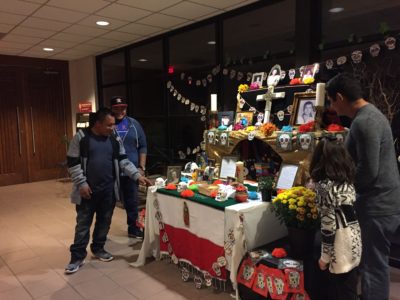
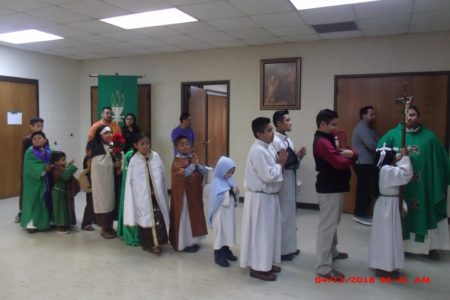
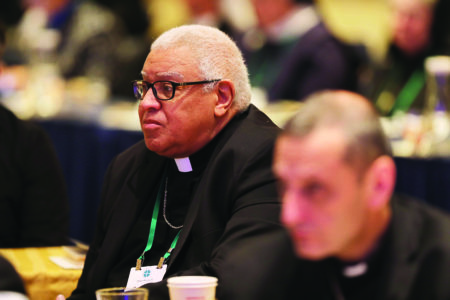
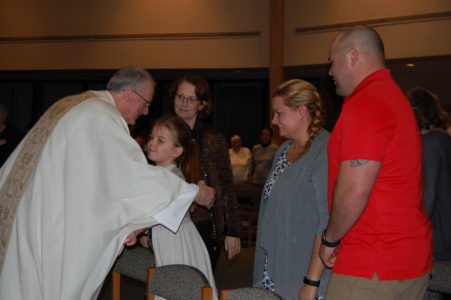 He came to Mississippi in 1967, invited by Michael Raff, who asked him to come and see life in this state which was in the middle of the Civil Rights Movement. “I saw what the Catholic Church was doing to help, making a difference, and how the priests were really involved in the community and I said to myself, ‘that is why the Lord is calling me here,”’ he said.
He came to Mississippi in 1967, invited by Michael Raff, who asked him to come and see life in this state which was in the middle of the Civil Rights Movement. “I saw what the Catholic Church was doing to help, making a difference, and how the priests were really involved in the community and I said to myself, ‘that is why the Lord is calling me here,”’ he said.
